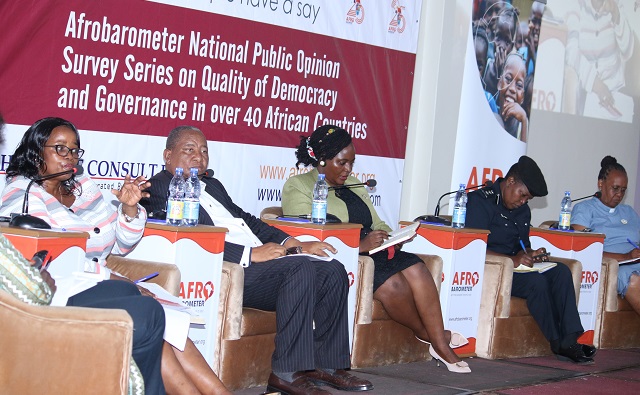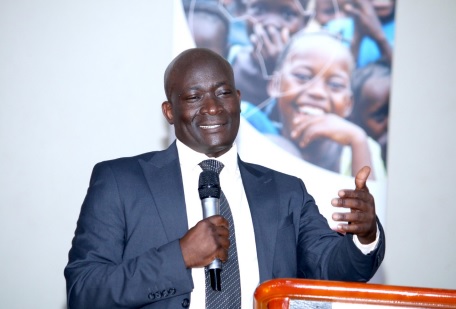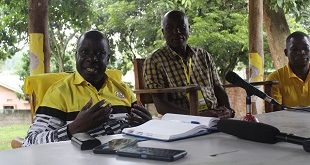
New report explores why women who want equal opportunity to work, still expect men to pay for every thing
ANALYSIS | RONALD MUSOKE | The latest survey report by Afrobarometer published in Kampala on Oct.03 has revealed several contradicting perceptions on gender issues among Ugandans.
Why, for example, does gender-based violence rank among the most significant women’s rights issue that should be addressed by the government yet, at the same time, people say “it is a private matter that should be resolved in the home” rather than a criminal matter that should be settled through the involvement of law enforcement agencies?
Afrobarometer, which published the report, is a non-partisan survey research network that provides reliable data on African experiences and evaluation of democracy, governance, and quality of life.
Its report titled: “Are social norms to blame? Exploring grey areas in safeguarding women and child rights in Uganda,” was released by Hatchile Consult Ltd, the Afrobarometer partners in Uganda.
Francis Kibirige, the co-national investigator said the main goal of the Afrobarometer surveys which have been running for the last 25 years across 42 African countries is to “to give African publics a voice in policy and decision-making.” It should be noted that these are perception-based surveys and perceptions change from year to year.
The latest survey in Uganda was conducted at the beginning of this year (16 January-2 February) and 2,400 respondents were interviewed face-to-face on their perspective on gender equality in education, employment, land ownership and leadership rights.
According to their latest findings, six in ten Ugandans (62%) say gender-based violence is a private matter that should be resolved in the home setting. At the same time, however, when asked whether police and courts should do more to protect women and girls from discrimination and harassment, 81% of women and 76% of men agree. It’s the same sentiment across rural/urban Uganda, age, region and education level as well as economic status.
Survey findings
Asked to mention which of the following issues related to women’s rights and equality they think is the most important for the government and society to address, four in ten respondents (42%) mentioned gender-based violence. This was followed by unequal rights of property ownership and inheritance (16%), unequal access to education (15%), too few women in influential positions in government (12%), and unequal opportunity or pay in the workplace (10%).
When it comes to frequency of violence against women and girls, one in two women (50%) said it is common for men to use violence against women and girls in their home or community. This sentiment holds true in both rural and urban Uganda where 48% (rural) and 51% (urban) of women said this is the case.
As far as regional distribution of violence against women and girls is concerned, northern Uganda leads with 56% followed by central (54%), followed by eastern Uganda (52%), Kampala (51%) and western Uganda (36%).
In terms of level of education, violence against women and girls is highest amongst people with primary education (51%) followed by those with no formal education. Among those with secondary education, it is 48% while, among those with post-secondary education, it is 44%.
When it comes to age, violence against women and girls is perpetrated mostly by people aged 18-40 years old (51%) followed by those aged 41-50 (48%), 51-60 years old (44%) and those above 60 years old (40%).
Violence against women and girls is also highest among people with high-lived poverty (52%) followed by those with moderate lived poverty (51%) and lowest among those with low or no lived poverty (44%).
When it comes to how often women are harassed sexually in public spaces, 10% said “always” while 20% said “often.” Also, when women or girls who report discrimination or harassment were asked how likely it is for people to believe them, 20% said “not at all likely” or not “very likely.”
According to the survey, while 72% say it’s never justified for a man to use physical force to discipline his wife, about half (49%) say it’s common for men to use violence against women and girls in their community.
While most citizens (84%) say the police are likely to take reports of gender-based violence seriously, 54% say a woman who reports such violence will probably be criticised, harassed, or shamed by others in the community.
Asked if domestic violence is a private or criminal matter, 54% of women said, it is a private matter while 69% of men said so. In rural areas, only 35% of people think domestic violence is a criminal matter while in urban areas, almost six in 10 people think domestic violence is a private matter.
Eight in 10 people in northern Uganda consider domestic violence to be a private matter. In eastern Uganda, the percentage is 60% while in central and western Uganda, it is 56%. Meanwhile, 55% of Kampala residents also think domestic violence is a private matter whose full resolution does not require the involvement of law enforcement agencies.
According to the survey, eight in 10 (82%) of Ugandans believe the government has performed “fairly well” or “very well” in promoting equal rights and opportunities for women. However, about six in 10 Ugandans (56%) say it needs to do more.
Esther Adeke Tumusiime, a Senior Superintendent of Police (SSP) working in the Child and Family Protection unit of the Uganda Police Force said she was not surprised by the findings of the Afrobarometer survey because they resonate with the Uganda Police Force’s annual crime report.
Adeke said the nature of Uganda’s socio-cultural norms that tend to reinforce gender-based violence are largely to blame for the state of affairs. She noted that the perception affects the police’s enforcement of the law on domestic violence.
“We have a lot of cases that have been prosecuted in the courts of law but still, culture is affecting police investigations because family members often frustrate these investigations,” she said.
Women inheritance of land
In terms of equal rights to land, about seven in 10 Ugandans (69%) support equal rights for women to inherit and own land. In regards to education attainment and employment disparities, about eight in ten Ugandans (78%) support equal employment opportunities for women and men, but gender disparities in education attainment and full-time employment status persists.
Respondents were asked, for each of the following statements, please tell me whether you disagree or agree: In our country today, women and men have equal opportunities to own and inherit land.
Almost six in ten citizens (57%) of the men agreed or strongly agreed that women and men have equal opportunities to own and inherit land while 40% of men disagreed or strongly disagreed that this is the case. Among women, 60% agreed or strongly agreed that this is the case while 38% disagreed or strongly disagreed.
In both urban and rural areas, there appears to be harmony among citizens (58% for urban and 57% for rural) who agree or strongly agree with the statement compared to those who disagree or strongly disagree (39%, 41% respectively).
In terms of regional perspective, those who agree or agree strongly that women and men have equal opportunities to own and inherit land are highest in the central region (62%) followed by northern Uganda and western Uganda (61%) and Kampala (60%). In eastern Uganda, only 45% of respondents agree with the statement.
Victoria Sekitoleko, the former agriculture minister and current chairperson of the Uganda Agribusiness Alliance, a non-profit, was the key note speaker at the release of the survey report. Sekitoleko said there are many “grey areas” that make women struggle to survive in Ugandan society.
“There are grey areas that represent quiet barriers we may overlook but profoundly affect the lives of women and children in Uganda,” she said. She mentioned inequality in education and land ownership.
“My grand fathers were educated; one of them worked as a clerk at the sub-county, while the other worked as a lay preacher but my grandmothers, nothing; they couldn’t read.” “I have women I have encountered in the past, none of them has ever inherited any piece of land in Uganda.”
“Where they come from, they didn’t inherit any land, where they went to marry, they were able to use the land but certainly not own and certainly not inherit it so they can’t bequeath anything.”
“There is no denying that Uganda has made progress,” she said, “Yet, for all the things we celebrate, gender inequality remains deeply rooted in economic empowerment, land ownership and employment.”
Girls barred from accesing education
In the survey, when asked about how frequently girls are prevented from attending school, 16% said “always” or “often” while 24% said “rarely. ”Yet, when asked about how frequently girls face discrimination, harassment, or requests for sexual favours from teachers, 12% said “always” 24% said “often,” while 30% said “rarely.”
Perry Aritua, the Executive Director of Women’s Democracy Network-Uganda, said dealing with negative social norms requires working with communities to appreciate the fact that gender-based violence is real.
Sekitoleko noted that education and empowerment is the foundation of real equality. “If a woman cannot read, does not have control over land or access to financial resources, how can she truly be empowered?”
Sekitoleko said more engagement with men, boys, and community leaders is needed to challenge the norms that hold back women and girls. “This is not about legislation; it is about cultural norms,” she said.
Women in politics
Uganda has made significant progress in promoting women’s participation in social, economic and political spheres over the last 30 years. Among the milestones registered so far include the 1997 adoption and 2007 revision of the gender policy which focuses on improving livelihoods, protecting rights, increasing women’s involvement in decision making, and promoting gender-sensitive economic management.
The 1995 Constitution and the National Gender Policy all reserve a certain number of Parliamentary seats for women, and women’s representation in Parliament has grown to 34% in the current Parliament.
Women also hold 43% of Cabinet posts and 46% of local government positions. In June 2021, President Yoweri Museveni appointed Jessica Alupo as vice president and Robinah Nabbanja as prime minister. The Speaker of parliament also is a woman.
In spite of this, Angella Nakasujja, a monitoring and evaluation officer at Hatchile Consult Ltd, says the gender gap in Uganda persists. “Women still lag behind men in education attainment; they are less likely than men to be employed and to own certain key assets; and they continue to trail men in political and civic engagement,” she said.
Employment opportunities
The respondents were also asked about whether women and men in Uganda have equal employment opportunities. Eight in 10 respondents (78%) agreed and only 20% disagreed.
When asked if men should be hired first in cases where jobs are scarce, 42% of the respondents agreed but 55% disagreed. Up to 66 of women said men should not be prioritized in the job market. This appears to be another contradiction.
“We have seen in the data many Ugandans don’t support the idea that men should be prioritised in the work environment; that it should be equal; that if one qualifies, woman or man, one should get the job (on merit),” Kibirige said.

“But we also have this kind of narrative and social norms where people say the man is the primary breadwinner in a home; he will pay the rent, buy food, pay school fees and, even when the spouse is gainfully employed, she will say ‘my money is money.’”
“And some people say if that is the social norm in the country, why shouldn’t we prioritise men in the job market since they have the biggest responsibility in society? So, on one hand, we are promoting gender equality but we are not talking about the silent social norms that continue to tell people to be realistic.”
In fact, according to the survey, up to 26% of women said they are “always” or “often” prevented from taking paid employment. The main barriers to women’ employment include; lack of childcare support (25%) followed by women’s lack of necessary education or skills (21%). Other barriers include the notion that it is not socially acceptable for women to work outside the home (17%).
The lack of remote or flexible work arrangements (11%) is another barrier while in other instances employers prefer to hire men (12%). Only 2% of the respondents admitted not knowing any barrier that bars women from entering the workforce.
Speaking on a panel during the unveiling of the survey report, Ruth Ssekindi, the Director for Complaints, Investigations and Legal Services at the Uganda Human Rights Commission noted that although Ugandan society is evolving, the cultural narratives and stereotypes have not changed much.
“While we are talking about women having a right to go to school, women have equal rights to own property, we note that there is a conflict between these rights and the traditional male masculine thinking of what a woman ought to be,” she said.
“Men and society still have traditional beliefs of what women should be and these stereotypes are deep-rooted,” she said. “If you need water right now, the first person you look for is a woman because we are accustomed to the idea that women should be the ones to provide such. When you think of a manager at a work place, you think of a man.”
“For us women who have got some positions that we are occupying, we have to work double or three times to achieve what a man can achieve because they are simply a man.”
Ssekindi said there is need to blend the issues of women’s rights with culture and religion.“We have sufficient laws and policies but the cultural and religious stereotypes that are persistent require sensitisation and awareness,” she said.
Angela Nakafeero, the Commissioner, Gender and Women Affairs in the Ministry of Gender, Labour and Social Development noted that there is urgent need to socialise boys to appreciate an empowered woman. “Social norms take long to change but the ministry is working closely with both the traditional and cultural leaders to transform some of the negative social and cultural norms,” she said.
 The Independent Uganda: You get the Truth we Pay the Price
The Independent Uganda: You get the Truth we Pay the Price



